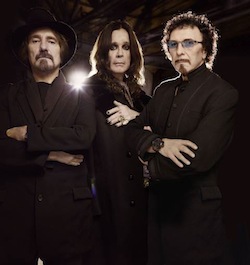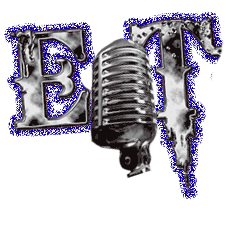 Mojo Magazine spoke with producer Rick Rubin about working with Black Sabbath on their latest album, 13. Portions of the interview appear below.
Mojo Magazine spoke with producer Rick Rubin about working with Black Sabbath on their latest album, 13. Portions of the interview appear below.
Q: When it came to working with Black Sabbath, what was your biggest challenge?
A: When I started working with them, they really hadn’t worked together in such a long time and, because they’ve had such success in their career over the years, it was almost a case of red light fever. There was an anticipatory anxiety among different members of the band and they were worrying about whether [the music] would be any good, and whether they were up to the task. The history and myth of Sabbath loomed large and everybody really wanted to do it justice. No one wanted to do it just for the sake of it. The idea was that we were only going to do this as long as this was going to be as good an album as they’ve ever made.
Q: As a student of Sabbath’s music, what is the high point in their career as far as you’re concerned?
A: To me it’s the first four albums. All have different high points. The reason Album One was so important conceptually to play it to them is because it was how they started it. It was closest to their roots because even Black Sabbath got influenced by Black Sabbath. If a song like Paranoid became very successful for them then after that you started hearing more of their albums rooted in the Paranoid idea and maybe less in jazz, blues and the psychedelic stuff that was part of that whole picture at first.
That’s what’s important about Black Sabbath: people think of them as heavy metal but really they’re pre-heavy metal. They have more in common with Cream and Led Zeppelin than they do with Iron Maiden. So the goal was to get that sort of breadth and depth in the record so that it had what you want from Sabbath but it showed the wider spectrum of what made them special. Clearly Metallica is influenced by Black Sabbath but if [13] ended up sounding like a Metallica record, even a great Metallica record, then we’d failed. It was like bringing back all those colors that the bands in their wake haven’t touched on.
It’s the big picture of Black Sabbath that I feel is actually best reflected on that first album. It really is. Even when they were listening to it, when I played it for them – after they’d stopped asking why I was doing that – they were surprised about how eclectic it was and how jammy it was, how much it felt like a performance which, if they’d played it the next night, may not have sounded the same as that. It really was much more a jazz-inspired, interactive jam.
Q: When you started on the project Bill Ward was still involved.
A: Absolutely.
Q: How did you feel when he wasn’t?
A: I would love Bill to have been involved and that was always the intention. When he decided not to be it really took everyone by surprise. It was a case of ‘What do you want to do? We have all these songs but what’s the process going forward?’ The band said that they wanted to continue. Then it was a question of trying to find a drummer who could allow them to continue to do it.
Q: You suggested Ginger Baker as a replacement at one point…
A: I did. He was on the list I submitted to them. Certain people were dismissed outright by the band based on having dealt with them on the past or the baggage. It wasn’t always about drumming ability.
I’ll tell you what the deal was. He was on my list because I wanted to get someone who had grown up in the same world as them and who jammed the way they did and there aren’t many of those people left. Most of them are dead. But I was asking: who grew up listening to the same music as them? Who played in bands where they jammed back then? It’s a very different thing from the way hard rock and heavy metal drummers play today. That’s the kind of drummer I was looking for.
Q: You also suggested Brad Wilk. Why?
A: Of all the people I heard them play with Brad had the best feel. I got chills when I heard him play with them. There were some other very good drummers [that tried out] but there wasn’t that emotional connection or that tension that you need musically speaking. To me every great band has emotional side. When it really works in a band there’s a tension that builds in the players. It’s not anything they even know about in some cases but it’s there. It’s the way each person in the band hears the same groove and the way one person in the band moves forward on the groove while the other moves back on the groove. That’s what makes a great band, that’s what makes The Rolling Stones sound like The Rolling Stones, that’s what makes AC/DC sounds like AC/DC where Malcolm Young pushes in a way where Phil Rudd lays back. The relationship between the guitar playing and the drumming is what creates this tension in the music and makes it really exciting. When Brad played with Sabbath you could feel that there was something pulling them. He had that emotional connection, or that tension that you need musically speaking. It’s difficult to explain, but there’s a feeling.
Q: According to Geezer there was an eleventh hour reshuffle in terms of the lyrics. Why?
A: Ozzy wasn’t happy from the beginning with the lyrics he had, and historically Geezer always wrote the lyrics on the Black Sabbath albums. It was as much a combination of Ozzy not being happy with the lyrics and Geezer having so much to offer lyrically. He wrote amazing lyrics on the album. It really was a mutual decision. It wasn’t me saying, These lyrics are shit, it was Ozzy saying ‘I don’t like these lyrics, we need to get Geezer to write some more.’
Q: Coming back to the record itself, so now that it’s finally finished, how does 13 measure up in terms of Sabbath’s previous work?
A: It feels like pure Black Sabbath. It scratches that Black Sabbath itch and it evokes the same feelings as those other [early] albums. I can’t wait for you to hear it.
Read more at Mojo Magazine.
source: mojo4music.com

4 Responses
Can’t wait for 13 !
Such a milestone in metal…so anticipated, and they hire Rick Rubin? He may have started out in the era of real production, and be able to claim such legends a Reign in Blood (which while awesome, sounds like shi*) his productions are dead, mixed too loud, messy sounding recordings. And pro tools has done him no favors… the modern stuff sounds even worse. When you can take one of the smoothest, warmest guitar tones in rock and make it harsh and annoying(Billy Gibbons La Futura)…you have really reached your zenith.
Ditto here, the 13 clips released so far sound neutered and lifeless…. Sabbath should be ashamed of themselves for putting this guy behind the console. Completely overrated.
Listen to God is Dead again. It’s a fantastic track. It sounds like you’ve decided ahead of time to dislike this album because of your apparent animosity toward Rubin.
I think 13 is going to be good. is god dead reminds me a little of psycho man from there reunion album. if the rest is that good it will be killer………